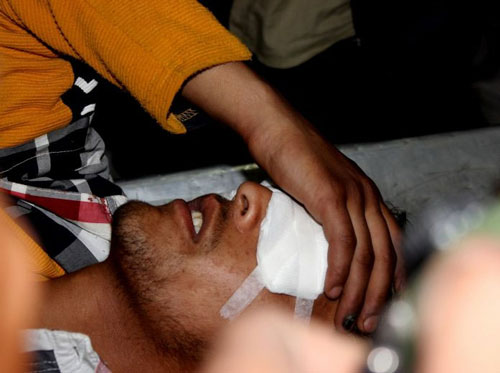Gafira Qadir Srinagar
Arshad Ahmad Khan couldn’t afford to shed tears at his parents’ funerals.
Two years have passed since they died at their home in Srinagar, but Khan still continues to hold back his tears.
“It hurts my eyes when I cry,” he said. “Only I know how it feels when my eye hurts. It feels like the end.”
Khan says he tries to avoid thinking about the losses of his life, however, he seldom succeeds. “If I think about it, I might die.”
Two years ago, in April 2018, Khan was caught in clashes between protestors and the government forces in Soura area of Srinagar when he was sitting on a shop front. He was gravely injured after the government forces shot metal-pellets at the crowd.
Trembling in pain, Khan barely managed to walk to the nearby tap amid the chaos and screams as he pressed his hands against a bleeding eye.
“Initially, I didn’t realize that it had hit my eye. The pain was unbearable,” Khan recalled. “I wish I had died that day. It ruined my life.”
He was rushed to Srinagar’s SMHS hospital along with other injured youth. Khan’s family was not aware of the incident till late evening when finally someone from the hospital managed to send the news across. “My mother did not believe it,” Khan said. “She was in denial.”
While he was learning to cope with the injury, Khan said his mother would spend her days and nights “overthinking about my disability”.
The metal-pellets that pierced his eyes damaged the optic nerve. Khan has lost 40 percent of vision in one eye.
Three months later, in July 2018, Khan’s mother succumbed to brain hemorrhage. “She died because of that stress,” Khan added.
Unable to bear the pain of separation, Khan said, his father too breathed his last three months after his wife’s death.
“I think I have exhausted my days too,” his father had told him. “I am handing you over to Allah now.”
From living in a tin shed seventeen years ago, Khan now has a modest three-roomed house in Narayanbagh area of central Kashmir’s Ganderbal area.
But since the death of his parents, everything has changed in his life, he said. “It doesn’t matter now,” he added. “My home is empty.”
With his parents’ death, Khan said he lost everything. But who is to be blamed? I asked. “The pellet injury.”
Choking at the thought of his parents, Khan refused to talk further about them. “My heart breaks everytime I talk about them,” he said in a breaking voice. “I can’t talk.”
Khan dropped out of school after fifth standard when his family didn’t have money to fund his study further.
To assist his father, then 11, Khan started working as a canteen staff at a hospital in Srinagar, where he was trained to cook and clean.
The training helped Khan to learn to live alone as he cleaned the house, cooked and looked after himself.
Khan, now 29, still has two metal pellets inside his body – one in an eye, another near his brain. He has undergone multiple surgeries but nothing worked to date.
He is among the hundreds of pellet-survivors, who have lost their vision or suffered partial damage since the government forces started using pellet shotguns on civilians in 2010.
So far, nearly 1500 people have suffered eye injuries with more than a hundred completely blinded, according to India Spend analysis of Ministry of Home Affairs’ data, devastating their lives and dreams.
Over the last decade, the usage of pellet shotguns has been criticized by several activists and human rights groups in Kashmir.
In 2020, Human Rights Watch had expressed concern over the use of pellet guns in the region after the government forces opened fire at Muharram processions in Srinagar.
“The Indian authorities should prohibit security forces in Jammu and Kashmir from using shotguns firing metal pellets to disperse crowds,” HRW said in a statement.
Before the injury, Khan used to make Pashmeena shawl – a garment made from soft wool. Now, however, he is dependent on finding work as a daily labourer for living. Some days, he is lucky. On others, he returns home disheartened.
The pellet injury has scarred all aspects of life. Khan said that his eye injury has made it nearly impossible for him to get married. “People don’t want their daughter to marry someone like me.”
But he hasn’t lost hope. “I want to stand on my feet again,” he said, adding that if he gets a proper job. “I want to work and then I will get married.”
The consecutive lockdowns since 2019, initially prompted by the abrogation of Jammu and Kashmir’s limited autonomy, and then by COVID-19 in March 2020, increased the sufferings for Khan.
Had it not been for her sister, he would have spent days without eating. When Khan spreads the tablecloth while eating, he is the only one who sits around it. “It’s hard to live alone,” said Khan. “It’s like climbing a mountain.”
Nobody except his three sisters visit him anymore. He sometimes goes to see his relatives to feel less lonely. “It would have been better if a bullet had hit me,” he said. “I would have attained freedom.”
—Courtesy: The Kashmir Walla










